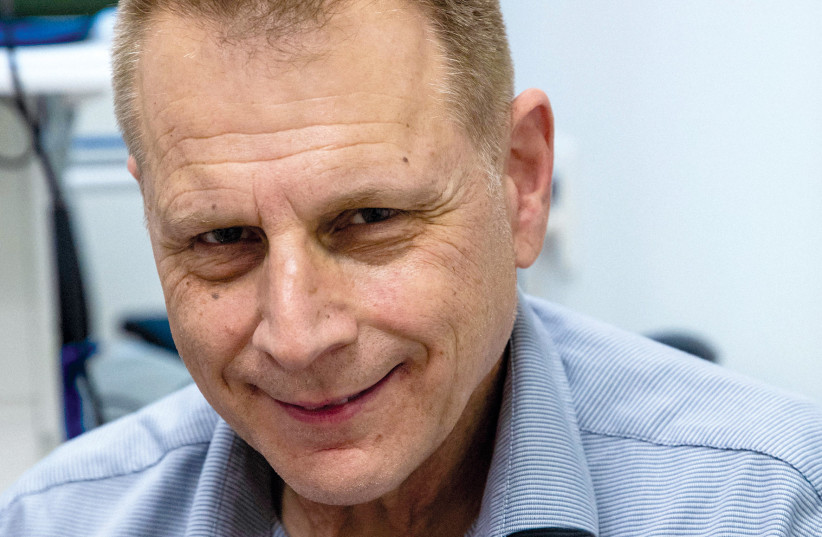Three Nobel Prize winners and an immigrant to Israel from Chicago are developing a drug that stimulates a patient’s immune system so that it can fight cancer on its own.
“We forget we have powerful immune systems and sometimes we need a nudge to get them going,” says NeoTX chief advisor and Nobel Prize laureate Prof. Michael Levitt.
He was awarded the 2013 Nobel Prize in Chemistry for the development of computer simulations of biological molecules. Levitt joined NeoTX last spring when it acquired InterX, a company that was using quantum mechanics to discover and design therapeutic molecules based on his work.
Two other Nobel Prize winners – Prof. Roger Kornberg, who serves as chairman of the board, and Prof. Arieh Warshel, an Israeli American biochemist – are also actively involved.
NeoTX’s technology is basically a “coating” of the cancerous tumor with bacteria, which stimulates the immune system to attack it when it enters the body. Early results from Phase I and Phase II trials of its drug naptumomab estafenatox (NAP) show when combined with more traditional cancer therapies – such as chemotherapy – show a promising response.

“Cancer drugs can be very helpful, but they are all subject to resistance. For most patients, they only work for a certain amount of time and then the cancer breaks through…. We think the key for patients is to have responses that are going to last longer. What we are doing is not so much trying to cure cancer, but to get the immune system back on track so it can kill the cancer on its own.”
Asher Nathan
“Cancer drugs can be very helpful, but they are all subject to resistance,” explains NeoTX CEO Asher Nathan. “For most patients, they only work for a certain amount of time and then the cancer breaks through…. We think the key for patients is to have responses that are going to last longer. What we are doing is not so much trying to cure cancer, but to get the immune system back on track so it can kill the cancer on its own.”
He says that on average, people develop five pre-cancer cells a day, but they don’t develop cancer because the body fights and kills these cells. “We are all getting cancer and all getting cured by our immune system,” Nathan says.
The challenge is that sometimes cancer cells can “hide themselves” from the body’s immune system so that it does not recognize them as a threat. Other times, they can influence the immune system not to kill the cancer cells or even use the immune system to thrive or multiply. NAP binds genetically engineered bacterial components to the tumor surface “fooling the immune system to thinking it is being attacked by bacteria and triggering a strong antibacterial immune response,” Nathan says.
In June, the company launched a Phase II trial in the US focused on patients with non-small cell lung cancer (NSCLC) who have been previously treated with chemotherapy and checkpoint inhibitors. NAP is being administered with docetaxel, a widely used cytotoxic chemotherapeutic agent that is a standard of care for people with NSCLC.
The safety of NAP in combination with docetaxel was previously shown in a small Phase I trial in the US, also involving patients with NSCLC. In that trial, one patient lived for 11 years which is much longer than would have been expected with docetaxel alone.
“Patients who enroll in Phase I trials like this one are generally out of options and they know they are at the end. So, when a patient survives, it is like a miracle,” Nathan says. “This one patient was expected to live two or three more months at most. But he took the drug and after six months he was able to stop taking any drug and live cancer free. It’s not something you see everyday.”
‘We have amazing bodies’
Although Nathan says he does not want to get people’s hopes up and he would not yet tout NAP as a “new cancer breakthrough” or something that is “going to eliminate cancer,” he is confident the drug represents “a shot at working and a lot of promise.”
The company is in the midst of a new funding round and Nathan says he hopes to use the money to launch more clinical trials and develop more drugs if the Phase II results come back as he hopes by the summer of 2023.
Levitt says that the world went into a panic when COVID-19 struck and there was a frenzy of pharma companies searching for vaccines and other cures. However, “there is no doubt that cancer causes much more death by any measure than the pandemic caused” and is a much more complicated disease. Therefore, he sees his work with NeoTX as something for the long term.
“If you look back 50 years, when someone would get diagnosed with cancer they would start preparing for their funeral,” he tells the Report. “Now, you can recover from cancer. We have made great progress.”
But he says that the world is ready for the next revolution in cancer treatment.
“I think what is novel with NeoTX is that they treat cancer by getting the body to fight the cancer better,” Levitt says.
He adds that people lived for two million years without modern medicine. Science and technology has enabled people to live longer. “NeoTX reminds us that we have amazing bodies and our bodies have amazing defense mechanisms. Tapping into these is a great idea,” he says.
When can patients potentially get access to NAP if it works?
“Very soon,” says Nathan. “If the Phase II results look good, then we hope to go into a registered Phase III trial that will take about two years. Then, by 2026 or 2027 the drug could be approved.” ■
